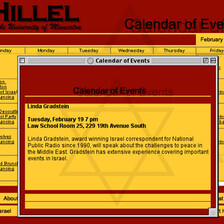The Electronic Intifada 20 February 2002
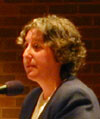
Gradstein speaking in the Law Center at the University of Minnesota, 19 February 2002.
In an email to The Electronic Intifada and to many other correspondents, NPR Vice President for News and Information, Bruce Drake, wrote that:
“Linda Gradstein will not be accepting an honorarium for her speech tonight. Nor will she accept honoraria in the future from groups on any side of the Mideast spectrum who have a direct interest in the subject matter that she covers.”Mr. Drake’s reference to Gradstein’s February 19 lecture at the University of Minnesota in Minneapolis, hosted by several pro-Israeli organizations, directly contradicts the stated intention of the organizing groups to pay Ms. Gradstein an agreed upon cash honorarium.
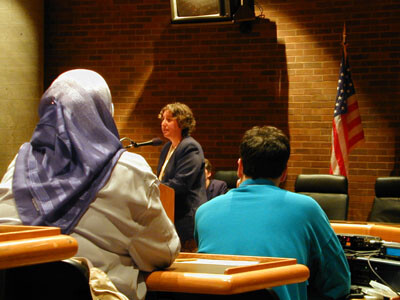
Gradstein speaking in the Law Center at the University of Minnesota, 19 February 2002.
The Electronic Intifada notes, however, that Mr. Drake’s latest email maintains his silence on Gradstein’s long-standing pattern of violating the prohibition on interest group honoraria. In the past, NPR has apparently taken alleged conflicts of interest involving Middle East reporting more seriously.
In 1995, for example, NPR released Maureen Meehan who had been reporting from the Occupied Territories, claiming that she did not adequately disclose to NPR that her husband had been an advisor to the Palestinian Authority.
In order to repair the damage done to its credibility by Gradstein’s misconduct, NPR should at a minimum disclose how much money she has received over the years from interest groups.
It is noteworthy that to all appearances, among groups with a direct interest in the Middle East conflict, Ms. Gradstein has only been the recipient of cash payments from Zionist organizations.
| PRO-ISRAELI FUNDRAISING IN EVERYONE’S NAME  Right: Hillel-produced flyer advertising Gradstein’s talk (click for enlargement). The flyer frames the event as a joint Hillel/Minnesota Public Radio production, following this with Linda Gradstein’s NPR bio, a list of co-sponsors and funders, and calls for tax deductible donations to Hillel. Right: Hillel-produced flyer advertising Gradstein’s talk (click for enlargement). The flyer frames the event as a joint Hillel/Minnesota Public Radio production, following this with Linda Gradstein’s NPR bio, a list of co-sponsors and funders, and calls for tax deductible donations to Hillel.
The flyer reads: “Co-sponsored by Friends of Israel, the Minnesota Journalism Center at the U. of M. School of Journalism and Mass Communication, the Classical and Near Eastern Studies Department, the Political Science Department and the Women’s Studies Department at the University of Minnesota. Funding has been provided by the Emet Fellows Grant of National Hillel, the Numero-Steinfeldt Foundation, and the University of Minnesota Community Initiative in partnership with Coca Cola. As part of MPR’s Broadcast Journalism Series, support for this event is provided in part by Fredrikson and Byron, P.A., Macalester College and Moss and Barnett.” Questions for future consideration should include why both a public radio station and a university journalism department (among others) would allow their names to be listed as co-hosts or co-sponsors together with blatantly pro-Israel political organisations, on actual fundraising materials, as in the case of this Hillel flyer. |
We are gratified that NPR has finally decided to explicitly commit itself to immediately enforcing its policy with respect to Linda Gradstein. The Electronic Intifada had made repeated attempts to gain such assurances from Mr. Drake in previous days but received only evasive answers that did not address concerns about the February 19 speech and other already scheduled Gradstein engagements involving possible unethical honoraria.
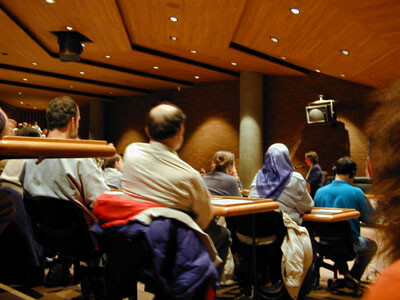
Gradstein speaking in the Law Center at the University of Minnesota, 19 February 2002.
The Electronic Intifada thanks all those who took the time to write to NPR about this very serious matter. However, given Ms. Gradstein’s long history of accepting cash payments from Zionist groups, and her questionable ethics, we urge all concerned to keep a close eye on her future public appearances.
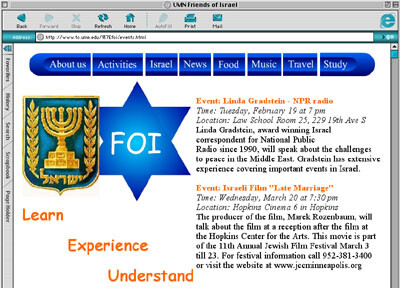
Friends of Israel website advert for Gradstein’s talk, found at www.tc.umn.edu/~foi/
You said…
“This apparent violation of NPR’s own rules appears to go overlooked at NPR. Ms. Gradsteins’ reporting has previously raised issues of fairness and this only fuels speculation that she (and NPR for continuing to allow it) is interested less in informing the NPR audience than she is advocating for a particular point of view.” — from a correspondent in Brooklyn, NY
“I have relied on NPR for most of my national and international news for two decades now because I believed the absence of commercial interests would lead to more complete and less biased information. One glaring exception has been NPR’s reporting on the Middle East in general, and Palestine/Israel issues in particular. Fortunately, I could listen to the BBC on the same station as NPR and that helped balance out NPR’s reports which seldom challenged Israeli views. It is regrettable that NPR’s reporting on that area is so misrepresentative. Linda Gradstein, as your chief correspondent, could barely be a more articulate spokesperson for the Israeli Government without being on their payroll. And now even that line appears to have been crossed with her speaking engagements at various zionist and pro-Israeli events.” — from a correspondent in San Francisco, CA
“As a listener of NPR, I do not want to listen to subjective reporting on any issue, whether it be one side or the other. Listeners want the facts, not the reporter’s opinion.” — from a correspondent in Merrick, NY
“I find it appalling that you continue to employ Ms. Gradstein when she clearly has compromised her objectivity. Telling her to stop accepting money from organizations who have a one-sided agenda is not enough. Are we to believe that no longer accepting gratuities is going to miraculously make her a fair and objective reporter?” — from a correspondent in Waxhaw, NC
“NPR did not take a firm stand with Ms. Gradstein. Its statement that Ms. Gradstein was informed about NPR policy and was expected to adhere to it, is just not enough. I believe a more firm position should be taken.” — from a correspondent at Stanford University, CA
“I am a long time NPR fan who, in the past, has been extremely troubled by Linda Gradstein’s obvious bias towards Israel. The revelation that Ms. Gradstein receives kick backs from pro-Israeli groups is a serious conflict of interest. I call on NPR to censure Linda for accepting cash from these groups and ensure that she and other NPR staff do not accept any cash or gifts from groups or nations which they report on. We expect the highest level of integrity from NPR and its journalists - please do not disappoint us.” — from a correspondent in Detroit, MI
“I learned today that Linda Gradstein has been taking cash honoraria from pro-Israeli lobby groups since 1993! No wonder her reports on the Israeli-Palestinian situation are always so biased. Shame on Gradstein, and double shame on NPR. By running Gradstein’s distorted reporting, you promote misunderstanding and help continue the slaughter in the occupied territories. NPR should replace Gradstein immediately with a reporter.” — from a correspondent in Port Townsend, WA
“It is, in my opinion… a clear cut conflict of interest that can only reflect poorly on NPR’s otherwise excellent reputation for in-depth news coverage. Ms. Gradstein’s continued association with NPR is a black mark on the network’s reputation. Her acceptance of funds from a blatantly pro-Israel group tonight just serves to underscore the nature and depth of her bias.” — from a correspondent in Washington, DC
“I am dismayed to learn that Ms. Gradstein is accepting money from pro-Israel groups in the United States. Reporting on, an from a highly sensitive and volatile region, Ms. Gradstein should be doing her utmost to ensure accurate reporting and minimum bias. Agreeing to speak at pro-Israel functions and to groups whose stated objective is to promote a pro-Israel political agenda, and on top of that, to accept money from these groups, is a violation of journalistic ethics that I would expect a respectable news agency such as NPR to do its utmost to uphold.” — from a correspondent living in Occupied Palestine.
Related links: EI’s Linda Gradstein cash payments exposé
This special report/action item (#23, 20 FEBRUARY 2002) was prepared by Ali Abunimah and Nigel Parry. Photos by Nigel Parry.



